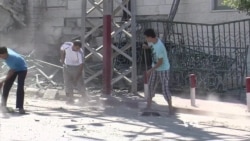After three weeks of intense Israeli bombardment and military invasion, Gaza Strip’s residents have developed a siege mentality.
People here are fearful, nervous, angry, and despairing. Everyone has experienced some hardship, some level of discomfort or deprivation. Everyone knows someone who has been wounded and at least one person who has been killed.
I’ve been Voice of America’s Jerusalem bureau chief for three years and have visited Gaza at least five times, usually for several days at a time. I was here during the Israeli-Hamas conflict of September 2012 and stayed until after the cease-fire negotiated by Egypt.
This feels more intense.
When I arrived Tuesday morning, after what local residents described as the most violent night since the current fighting began July 8, I visited the remnants of the Amin Mohammad mosque.
One of Gaza City’s principal mosques, it was destroyed, gutted, with a fire in the basement. A house across the street, belonging to Palestinian Authority President Mahmoud Abbas, sustained light damage.
Israel accuses Hamas of concealing weapons and rocket-launching sites in mosques, schools and other civilian places. As a result, the sites become targets.
Chaotic scenario
The chaos breeds confusion and misinformation. Some news accounts said children were playing in a park Monday when a missile struck. It’s not a park, it’s a residential street.
But it was where eight children and two adults were killed, and many others were wounded. A rocket landed in the garden of nearby Shifah Hospital, where they were taken to be treated. Hospital workers say they’re starting to run short of supplies.
Palestinians seem to have adopted a fatalistic attitude that there’s nowhere safe to go. Even one of the schools operated as a shelter by the United Nations – which now is housing more than 100,000 people – was hit last week.
To get out of Gaza, you need special permission from the Israeli authorities. Very few receive it. Right now, all the border crossings to Israel and Egypt are closed to all but a few -- journalists, VIPs, some relief workers.
Humanitarian cease-fires in recent days allowed people to leave their homes to re-stock their food and take care of basic necessities.
But basic supplies are becoming scarce. Blockades and bombed gardens have made food expensive. Refrigeration has been difficult, because Gaza was only getting a few hours of power a day.
Tuesday’s bombing of Gaza’s main power plant will cut electricity to places that don’t have generators. Many hospitals and commercial operations, and residents with sufficient means, already have bought them. Otherwise, they can’t charge their mobile phones or get news.
Sanitation woes add to challenges
Sanitation poses a growing problem. Garbage hasn’t been collected – either because the streets are impassable or workers are fearful – and bombings have damaged the sewage system. The stench of rotting garbage and sewage pervades everywhere.
Health officials say a shortage of clean water means a looming crisis. But Gazans are more worried about surviving the night.
If recent days are any indication, some won’t.
Basel Meqdad heard a blast Monday, when his younger brother was outside playing with dozens of children. He ran out and saw his younger brother, Mohamed, lying on the pavement.
“He was dying,” he told me and my interpreter. “He was telling me there is something in my heart. I looked at his heart and I found it was outside his body. I told him, don’t be afraid. You will be OK.”
Seven other children and two adults also died in the blast. Israel said it came from a misfired Hamas rocket. But no one here believes this.
In recent days, Israeli strikes also hit the fishing port, a government office building and a major hospital
Gazans say they feel helpless in the onslaught. But they say it only hardens their resolve to resist.






